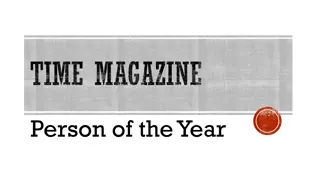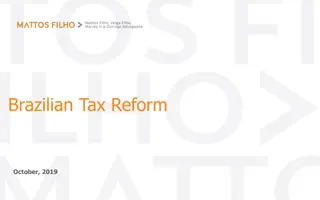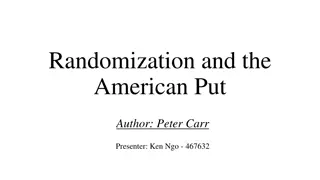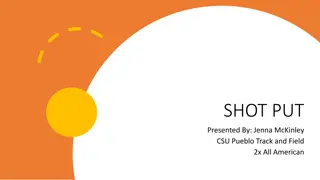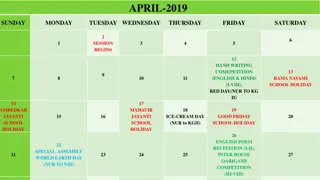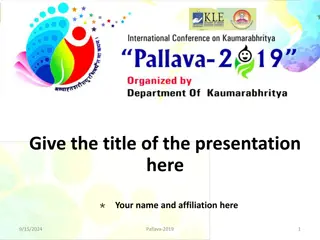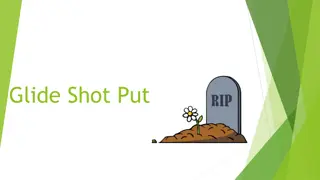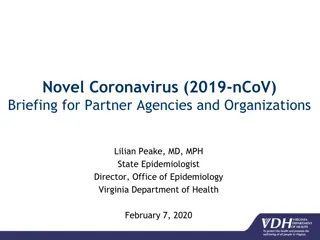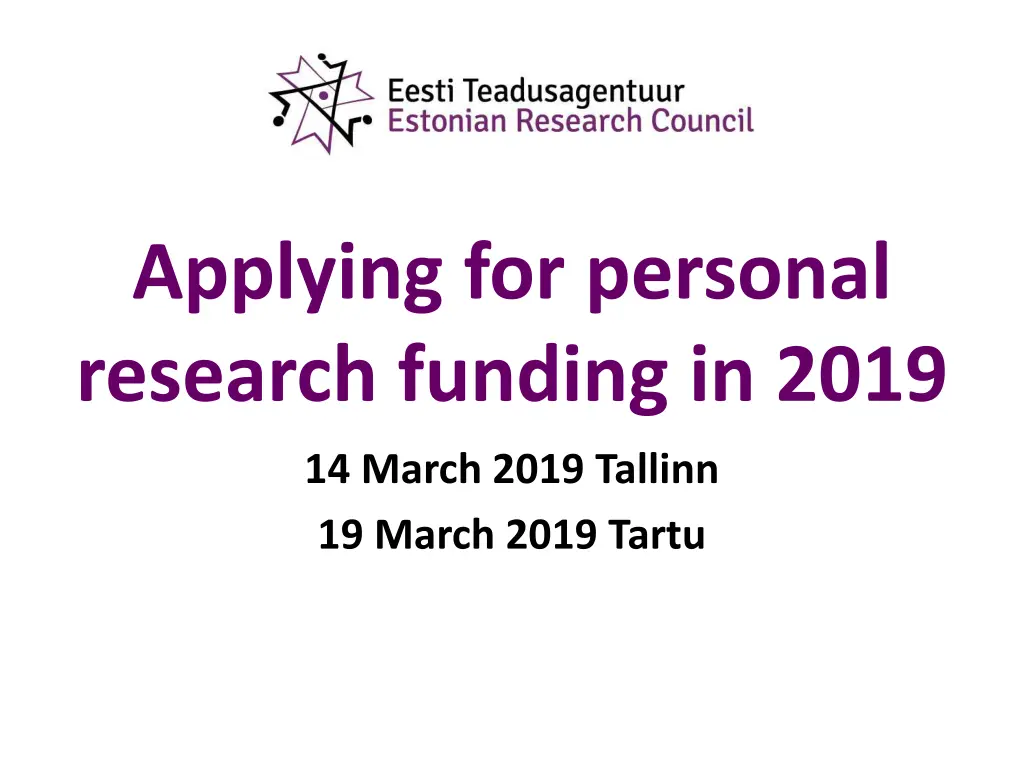
Personal Research Funding in Estonia 2019: Overview & Application Process
Learn about the opportunities available for personal research funding in Estonia in 2019, including eligibility criteria, application deadlines, and grant types such as postdoctoral, start-up, and team grants. Discover the general principles and guidelines for applicants, success rates from previous calls, and detailed information on who can apply for each grant type.
Download Presentation

Please find below an Image/Link to download the presentation.
The content on the website is provided AS IS for your information and personal use only. It may not be sold, licensed, or shared on other websites without obtaining consent from the author. If you encounter any issues during the download, it is possible that the publisher has removed the file from their server.
You are allowed to download the files provided on this website for personal or commercial use, subject to the condition that they are used lawfully. All files are the property of their respective owners.
The content on the website is provided AS IS for your information and personal use only. It may not be sold, licensed, or shared on other websites without obtaining consent from the author.
E N D
Presentation Transcript
Applying for personal research funding in 2019 14 March 2019 Tallinn 19 March 2019 Tartu
Previous call (2018) In PUT call 2018, 76 new projects received funding, incl. 14 postdoctoral projects 24 start-up projects 38 team projects in total amount of 8,727,100 euros (See: Funded projects) but 366 applications in total amount of 44,911,539 were processed (success rate 22%) 2
In call 2019 you can apply for a postdoctoral grant (outgoing) (PUTJD, up to 3 years) start-up grant (PSG, up to 4 years) team grant (PRG, up to 5 years) you can compile and submit your application via the Estonian Research Information System (ETIS) from 1 April to 30 April at 17:00 p.m. the total amount of funded projects will probably be about 16.5 mln euros 3
General principles of personal research funding The applicant must be the PI of the project Research grants for capable researchers from all countries Employment contract with a positively evaluated Estonian R&D institution is obligatory Start-up and team projects have to be implemented in Estonia It is not allowed to be the PI/senior staff of several PUT projects or institutional research funding topics (IUT) Fixed grant amounts are used 4
Who can apply for which grant? (1/2) A person can simultaneously apply for one PUT grant but may be listed as a member of the senior research staff in yet another PUT grant application A person cannot apply for a grant if his/her application has failed to reach the threshold in two consecutive calls; he/she has, during three years before applying for a grant, failed to submit the report on a previous project funded by the Council by the deadline without a valid reason or the report has not been accepted by the Council. 5
Who can apply for which grant? (2/2) The applicant for a postdoctoral grant: has received his/her PhD not earlier than 30.04.2014; has received his/her PhD in Estonia; has worked/studied at least 1 year in Estonia before 30.04.19. The applicant for a start-up grant: has received his/her PhD between 1.01.2013-1.01.2018; has gained research experience after the PhD (preferably abroad); has not been the PI of a start-up or exploratory project or the PI of an IUT topic. The applicant for a team grant is a researcher with a PhD degree NB! A person cannot apply for a team grant if he/she is the PI of an IUT or PUT grant which continues in 2020. 6
Who can participate in a grant project? A PUTJD project is an individual grant. In a PSGproject, other members of the (senior) research staff can also participate if they have the necessary qualification for carrying out the tasks; they are working or studying at the same institution; the salary of the senior staff must be fully or partially covered from the grant. In a PRGproject, it is obligatory to involve other members of the (senior) research staff: senior staff members have to have a PhD (or equivalent qualification); the salary of the senior staff must be fully or partially covered from the grant; (senior) staff can work at another Estonian R&D institution. 7
Important changes Increase of the fixed grant amounts (coefficient 0.7 -> 0.9) The mark inappropriate for the requested grant type and amount does not mean that the application will automatically remain below the threshold A postdoctoral project has to begin within 6 months An explanation about how the results of the project will be disseminated to the public An explanation about the ethical issues specific to the project The ones who receive the grant have to submit a data management plan So-called bridge grant short-term/one-year grant for PSG/PRG projects which did not receive a grant despite high scores 8
Fixed grant amounts The fixed grant amounts consist of direct costs and overhead costs The direct costs consist of staff costs and research costs The grants are either small or large Depending on the specifics of the research field, small and large grants are divided into experimental and non-experimental grants Overhead costs make up 25% of direct costs in case of start-up and team grants, and 5% in case of a postdoctoral grant The applicant of a start-up or team grant has the right to request a smaller grant amount than the fixed grant amount 9
Fixed postdoctoral grant amounts Postdoctoral grant Direct costs (per year) Overhead costs (per year) Total fixed grant amount (per year) Non- experimental 40,800 2,040 42,840 Experimental 43,200 2,160 45,360 The rates of the relocation allowance are as follows: For projects lasting up to one year 4,000 euros For projects lasting up to two years 5,500 euros For projects lasting up to three years 7,000 euros 10
Fixed start-up grant amounts Direct costs (per year) Overhead costs (per year) Total fixed grant amount (per year) Start-up grant Non- experimental small 48,200 12,050 60,250 Non- experimental large 77,100 19,275 96,375 Experimental small 52,100 13,025 65,125 Experimental large 83,600 20,900 104,500 11
Fixed team grant amounts Direct costs (per year) Overhead costs (per year) Total fixed grant amount (per year) Team grant Non-experimental small 135,000 33,750 168,750 Non-experimental large 190,300 47,575 237,875 Experimental small 146,600 36,650 183,250 Experimental large 205,700 51,425 257,125 12
Tips for applicants (1/3) The call will open on 1 April and close on 30 April at 17:00 p.m. (Estonian time). NB! The application is submitted only after the institution has confirmed it via ETIS. Please follow the deadlines of your institution. Write the application yourself. If using texts from other authors, cite them properly. Update your CV check your employment data, projects, clearly indicate your research experience (e.g., postdoc), etc. Clearly bring out your contribution to the research articles and projects attached to the application. 13
Tips for applicants (2/3) Calculate a realistic budget and justify the requested grant amount. When approving grant applications, no changes will be made regarding the applied grant amounts. This means that, e.g., an application for a large team grant will be either approved or not approved. Do not apply for a large grant because you believe that the amount will be reduced anyway. Requesting a different amount than the fixed amount is reasonable if it is significantly smaller or larger than the prescribed fixed amount of this grant type. Take the questions on research ethics and data management seriously. 14
Tips for applicants (3/3) Use the text boxes provided in the application form to add all relevant comments. Add only the files which are allowed and only as PDFs. If necessary, add the applications for making exceptions. While writing the short summary of the project, please consider that it is meant to be understandable for a wider public. Describe of the importance for Estonian research, culture, society, and/or economy Read the Guidelines for Evaluating Personal Research Funding Applications very carefully. Put on the reviewer hat before confirming your application. 15
The evaluation process Six research fields (the OECD Frascati 2015 Manual): Medical and health sciences Humanities and the arts Natural sciences Agricultural and veterinary sciences Social sciences Engineering and technology Indicative timeline: Checking the technical details of applications: May Evaluation: June-September Expert Panel and Evaluation Committee meetings: October Preliminary funding decisions: November Final funding decisions: December 16
More information (1) Regulations and guidelines regarding the PUT call 2019, incl. frequently asked questions 17
More information (2) General info: Siret Rutiku (siret.rutiku@etag.ee, tel 731 7381) Medical and Health Sciences; Agricultural and veterinary sciences: Ade Kallas-Kivi (tel 731 7366, ade.kallas-kivi@etag.ee) Bio and Environmental Sciences: Lairi Bakhoff (tel 731 7363, lairi.bakhoff@etag.ee) Social Sciences, Humanities and the Arts: Hele Priimets (tel 730 0326, hele.priimets@etag.ee) Engineering and Technology: Raili Torga (tel 731 7358, raili.torga@etag.ee) Exact Sciences: Mikk Vahtrus (tel 731 7367, mikk.vahtrus@etag.ee) 18
Thank you for your attention! Any questions?







